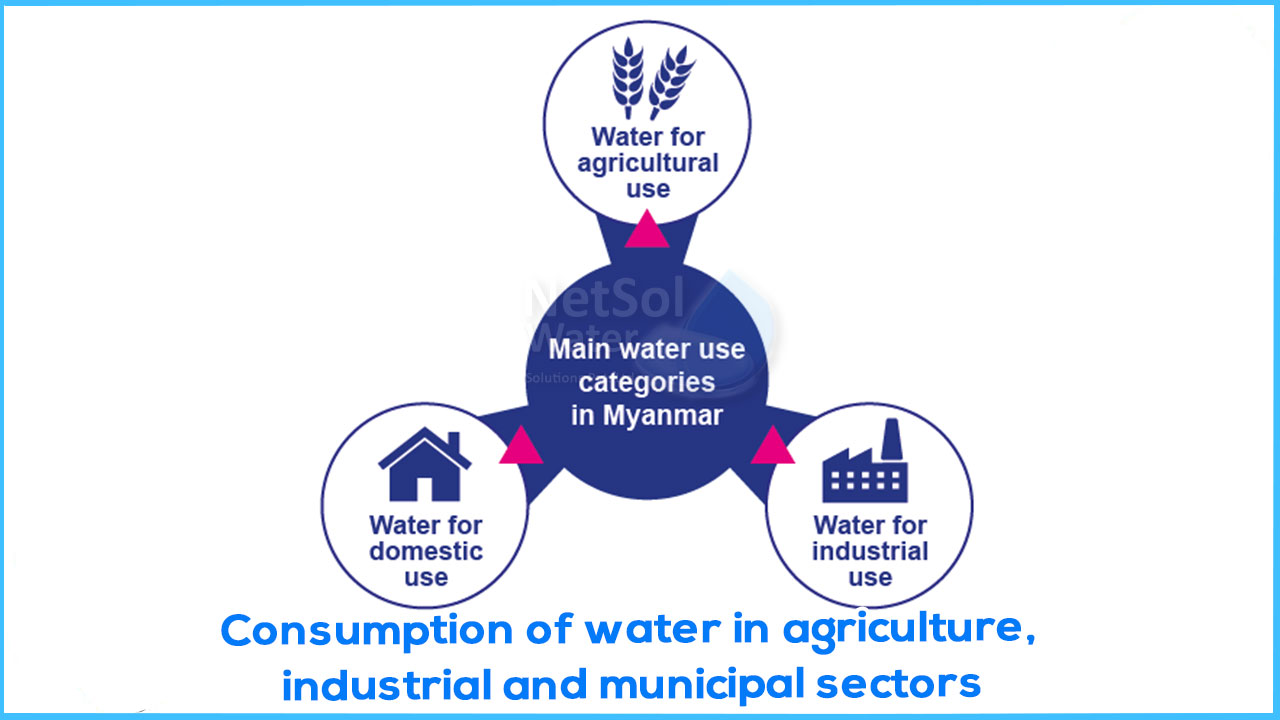Consumption of water in agriculture, industrial and municipal sectors
Many businesses and the products they offer would cease to exist in the absence of water. Water is used in nearly every step of the manufacturing and production processes all over the world. Whether it's deionised water for the electronics and pharmaceutical industries, or softened water for boiler feed applications, water is essential and is embedded in the footprint of almost every item created on the planet. To put this in context, industry accounts for roughly 40% of total water abstractions. At the same time, many global companies have manufacturing facilities in water-stressed areas of the world, with more than two-thirds of companies now reporting water exposure.
WATER CONSUMPTION IN DIFFERENT SECTORS
The country's water requirements have been determined as a result of the country's ever-growing population, large-scale urbanisation, and changes in food consumption, lifestyle, and land-use patterns. Although India receives adequate rainfall, it is not distributed evenly across the country. Agriculture is one of India's most important industries, and irrigation is the largest consumer of water. Furthermore, as the population and industrial activities have grown, so has the use of water in a variety of sectors. This increase is unsustainable and is exacerbated by climate change.
AGRICULTURE SECTOR
India is the world's agricultural powerhouse. Agriculture is by far the most water-intensive industry. The consumption accounts for roughly 80% of India's total water consumption. More than half of this water comes from underground sources. This level of reliance is causing the depletion of underground water levels. Another issue is the pollution of groundwater and surface water caused by the use of untreated wastewater in agriculture. This, in turn, leads to abnormalities in crop yield and farmer health. Proper treatment, on the other hand, can aid in the efficient use of nutrient-rich wastewater for agricultural purposes, as well as the farmers' livelihoods.
INDUSTRIAL SECTOR
For a long time, industries dumped their waste into bodies of water without treatment. This has had a negative impact on both the health of living organisms and the environment. Even today, some industries continue to practise the same method. It is critical to consider the societal and environmental consequences, which are becoming more severe by the day. Various cutting-edge technologies, such as the Disc Tube (DT) based RO system and the Waste Heat Evaporator, have enabled industrial wastewater to be recycled for re-use.
According to a report, the industrial sector is a major water consumer, accounting for approximately 22% of global water use. This percentage will rise in the coming years, increasing the generation of wastewater. As a result, it is critical that all industrial plants install a strong wastewater treatment system.
MUNICIPAL SECTOR
As the population grows, there are many low-income areas where large amounts of wastewater are discharged untreated into drains and natural water resources. This wastewater contains household effluents, human waste, hospital waste from urban areas, chemicals, and so on. All of these elements combine to make the wastewater extremely toxic. However, there are some locations where wastewater is collected and treated. However, the effectiveness of the treatment is determined by the system in use. With the rapid growth of the urban population, this could become a major issue. It is critical to install and upgrade existing wastewater treatment systems in order to recycle harmful wastewater for reuse but Netsol can provide all the solutions, as we want a sustainable development for our nation, both economical and ecological.




